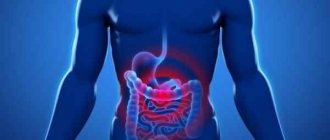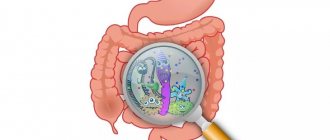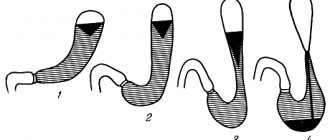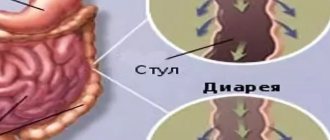Types of painful sensations
Depending on the nature of the course, stomach pain can be:
- Visceral. In this case, the nerve endings on the abdominal wall are irritated. This pain feels like intestinal or hepatic colic.
- Parietal. It has a specific location and is therefore accompanied by severe pain. Symptoms worsen with movement or breathing.
- Psychogenic. They occur against a background of anxiety and nervous excitement.
- Neurogenic. Accompanies some neurological diseases. As for sensations, lumbago is felt, which can disappear and appear again.
Depending on the intensity, night pain in the stomach is divided into:
- pulsating;
- cramping;
- stupid;
- spicy;
- aching;
- shooting;
- burning and others.
In this case, the sensations may be increasing, monotonous or fading. And depending on the duration, they can be acute or chronic.
Alarming symptoms
Night stomach pain in itself is an alarming symptom. However, when they are accompanied by functional disorders of the body, you should visit a doctor.
Among the dangerous symptoms are the following:
Such manifestations are a sign of the presence of pathology of the gastrointestinal tract.
Darkening of stool can also be caused by taking Activated Charcoal.
Causes
Most often, stomach pain occurs due to digestive problems. The abdominal cavity contains many organs that can change their position. This can be associated not only with any pathology, but also with the position of the body and time of day.
The following causes of nighttime stomach pain should be highlighted:
- Violation of peristalsis. Closer to sleep and during it, the movement of the walls slows down, which can result in problems.
- Increased acidity. Associated with a high content of hydrochloric acid in the stomach (i.e., its walls begin to digest themselves).
- Lying position. During sleep, all organs change their position, which can result in discomfort.
- Gastritis. The stomach is protected from harmful influences thanks to the mucous membrane. In some cases, this protection is destroyed and inflammatory processes begin. As a result, erosion or ulceration may appear.
- Ulcer. It forms on the gastric mucosa and very often its exacerbation is characterized by pain radiating to the chest and back.
- Reflux. Appears as a result of the inflammatory process and is accompanied by nausea and heartburn. Manifestations of the disease intensify in a supine position.
- Incomplete bowel movement.
- Gallbladder problems.
- Eating too salty, fatty, hot or cold foods before bed.
- Dairy intolerance.
- Pregnancy. During this period, hormonal levels constantly change, and organs are compressed as the fetus grows.
Features of night pain
Pain is a significant adaptive reflex of the body. It can act as both a preventive and a defensive reaction.
Abdominal discomfort is a complex clinical symptom. Due to the fact that many vital organs are concentrated in this area, determining the source of pain is quite problematic. The range of manifestations of pain is wide - cramping, sharp, pulling, aching, cutting, colic-like.
Nighttime “digestive” pain is often accompanied by a strong feeling of hunger
If pain occurs in the epigastric region after going to bed, the features of the manifestation of the pain syndrome should be differentiated. If the attack lasts no more than 1 minute, there is no cause for concern. If the discomfort does not go away within 1 hour, you should seek specialized medical help.
Pain activates the body's functional systems to protect against negative influences
Table 1. Categories of abdominal pain
| Variety | Characteristic |
| Visceral | It is considered a consequence of irritation of nerve endings located on the walls of the peritoneum. In most cases it is caused by the following factors: |
- increased pressure in the stomach;
- disruptions in the circulatory system.
Any compression or stretching of internal organs can provoke this type of pain. A person perceives it as squeezing, deep, and radiating into the skin. It has no specific localization and is quite long in duration. The degree of intensity is similar to the sensations during an attack of hepatic colic or inflammation of appendicitis. ParietalAlso provoked by irritation of the walls of the abdominal cavity, but always has a clear localization. The intensity increases as you walk. Often observed with peritonitis. NeurogenicIs the result of neurological diseases. Pathologies of the peripheral nervous system, especially diabetic neuropathy, can manifest themselves through discomfort in the peritoneum. Pain is characterized by a shooting nature. It suddenly appears and disappears just as quickly. Reflex This type of pain is sometimes called referred. It can be localized in areas located at a distance from the source of excitation. Often appears with stomach diseases.
A psychogenic type of pain is also felt in the abdomen. However, it has a completely different nature of occurrence. It arises as a consequence of suspiciousness and excessive anxiety.
Peptic ulcer
The presence of an ulcer indicates that the integrity of the gastric mucosa has been compromised. Any inflammation in this area may be accompanied by sharp or dull pain. Very often patients experience pain throughout the entire abdominal cavity.
An ulcer may cause nighttime hunger pain in the stomach. As a rule, after a snack, unpleasant symptoms go away. Exacerbation of the disease most often occurs in autumn and spring and depends on nutrition. For example, it can be triggered by frequent overeating, drinking alcohol and fatty foods.
Depending on the severity of the disease, various unpleasant sensations may appear. Most often this happens 40 minutes after eating. With such pain, one should suspect that the disease has affected the upper parts of the stomach. At this stage, belching, a feeling of heaviness and hunger (at the same time), and abdominal pain appear.
An ulcer may appear 3-6 hours after eating. At this stage, foul-smelling belching due to poorly digested food may be bothersome. It irritates the stomach and causes heaviness in it.
Different stages of disease development may be accompanied by:
- Feeling hungry. Because of it, cramps in the stomach may appear, because digestive juice with hydrochloric acid begins to destroy the mucous membrane. To avoid this, you need to eat fractionally (5 times or more).
- Periodic pain. The unpleasant sensations do not last long, but they indicate another exacerbation of the disease. All manifestations usually go away on their own and do not require medication.
- Night pain in the stomach area. In this case, they are so strong that the patient wakes up. This is typical for both a full and hungry stomach. Milk will help improve your condition quickly.
- Acute pain. This symptom is scary because it can appear due to a perforation of the stomach wall. With it, the pain is such that a person cannot get up. If left untreated, the ulcer can be fatal. The following symptoms are added to the pain: fever, vomiting, blood in the stool.
Clinical manifestations of pain
In addition to the characteristics of pain, other parameters for its assessment should be taken into account. Before visiting a specialist, you must evaluate the following criteria:
- intensity;
- duration;
- etiology;
- features of occurrence;
- factors influencing increase or decrease.
An important point is the localization of night pain. If it is concentrated in the upper peritoneum, there is a possibility of having a stomach or duodenal ulcer or pancreatic disease. If pain from the central part of the abdomen radiates to the left hypochondrium and is reinforced by a feeling of hunger, doctors diagnose gastritis.
Often, pain that is felt as “stomach” can refer to other internal organs.
Table 2. Possible diseases with “stomach” pain
| Characteristics of pain | Possible diseases |
| Rapid onset within a few minutes. It is difficult for the patient to move. |
Gastritis
Also, nighttime hungry stomach pains are characteristic of gastritis. Their appearance is associated with an increase in the amount of acid in gastric juice. As a result, the walls begin to digest themselves.
Let's try to figure out what causes gastritis. The disease can be triggered by stressful situations: emotional distress, physical activity, poor nutrition. At the same time, the secretion of gastric juice increases and a spasm occurs. Symptoms such as diarrhea and nausea may also occur.
Depending on how advanced it is, the disease may have the following symptoms:
- aching, prolonged pain in the stomach (may radiate to the lower back);
- heartburn after eating (may be accompanied by bloating);
- diarrhea;
- belching and increased pain after eating (especially fatty and smoked foods).
Some patients try to relieve the condition and induce vomiting. But doctors do not recommend doing this, because hydrochloric acid will further corrode the walls of the stomach. Most often, pain appears during exacerbation of gastritis; the rest of the time the body does not cause any trouble.
Pancreatitis
Stomach problems can lead to a serious illness called pancreatitis. In this case, the pancreas is involved in the process. Diseases leading to pancreatitis can be the cause of night pain in the stomach (the diagnosis must be made by a doctor). The disease has two forms: chronic and acute.
Chronic pancreatitis occurs:
- Light. Accompanied by minor pain and rarely recurs.
- Average It is characterized by: decreased gland function, prolonged and noticeable pain, increased protein, fat, and muscle fibers (in tests).
- Heavy. Exacerbations are repeated frequently (more than 5 times a year), painful and prolonged. If left untreated, complications will arise in the form of exhaustion, diabetes, and duodenal stenosis.
Reasons for the development of pancreatitis:
- increased pressure in the biliary tract (and obstructive jaundice appears);
- ulcers, gastritis and similar problems;
- constant consumption of junk food and alcohol;
- hormonal imbalances;
- poisoning with drugs or chemical elements;
- infectious diseases;
- pancreas injuries;
- heredity;
- severe stress.
Pancreatitis has the following symptoms:
- Pain in the stomach (night, day, morning). This manifestation is very often associated with the presence of gastritis, ulcers, etc. The intensity and duration of pain depends on the form of the disease. Unpleasant sensations can be in the left, right hypochondrium or spread throughout the body.
- Heartburn, nausea, vomiting, flatulence, lack of appetite.
- The face takes on a yellowish tint.
- Low pressure.
How to understand that it is the stomach that hurts
Unpleasant sensations are observed in the epigastric region and left hypochondrium. When this organ is stretched by drinks and food, the pain may slightly change the location.
It is worth considering that the kidneys, spleen, intestines, and pancreas are located in the same area. Therefore, pain syndrome can be provoked by other organs. Night pain should be compared with accompanying symptoms.
Disturbances in the functioning of the stomach are indicated by:
- loss of appetite;
- hiccups;
- gagging;
- nausea;
- flatulence;
- belching.
Intestinal infections
Problems with the digestive system (including nighttime stomach pain) can be caused by pathogenic bacteria. The main symptoms include nausea, vomiting, elevated body temperature, and pain in the abdomen. If all of them are present, then it’s time to see a doctor - he will prescribe tests and make a diagnosis. It should be remembered that with reduced immunity, infections can lead to dire consequences.
The main source of various harmful bacteria is expired food. However, it is either stored incorrectly or for too long. For example, drinking spoiled fresh milk can lead to dysentery, and meat, eggs and poorly washed vegetables can lead to salmonellosis.
Symptoms of intestinal infection:
- Pain in the stomach (at night and not only).
- Nausea and vomiting.
- Diarrhea. In this case, it acts as a protective reaction of the body against bacteria (allows them to be removed). Diarrhea is dangerous due to dehydration and exhaustion.
- Bloating.
- Loss of appetite.
- Temperature increase.
- Constipation (possible with helminthic infestation).
- Insomnia.
- Decreased immunity. This is due to the activity of pathogenic bacteria that absorb nutrients and release toxins.
- Depression and headache.
- Skin rashes accompanied by itching and burning.
Treatment of intestinal infections consists of restoring the water-salt balance. That is, the patient needs to drink enough, take sorbents (Polysorb, Smecta). If you are seriously losing fluid, you should consult a doctor to avoid dehydration.
Diagnostics
If you notice unpleasant symptoms accompanying intestinal pain, you must consult a doctor to undergo a full diagnostic study. It may include the following procedures:
- Fecal analysis.
– Coprogram
.
Performed to assess food digestion. – Bacteriological research
. Involves identifying intestinal infections and determining the ratio of beneficial and pathogenic bacteria.
Endoscopic examination. An endoscope is used to assess the condition of the mucous membrane.
– Fibrogastroduodenoscopy.
Examination of the upper intestine.
– Colonoscopy
. Checking the lower intestines for lesions, collecting material for a biopsy.
– The top one.
The esophagus, stomach, and small intestine are visible.
- Capsule.
Detection of Crohn's disease.
Reflux disease
In this disease, the contents of the stomach are thrown into the esophagus. As a result, its mucous membrane suffers, heartburn or a more serious complication begins. The stomach produces acid to which it is adapted, but the esophagus is not ready for such a load. There is a sphincter between the esophagus and the stomach, which should prevent such reflux. But if the valve does not work correctly, reflux develops.
Causes of the disease:
- abuse of junk food;
- diaphragmatic hernia (part of the stomach prolapses through a hole in the diaphragm);
- pregnancy;
- obesity;
- bad habits;
- low physical activity;
- frequent consumption of salty foods;
- lack of fiber;
- taking certain medications (antihistamines, painkillers, sedatives).
The main symptom of reflux disease is heartburn (burning sensation in the chest area). The condition worsens when lying down or after eating and can last for several hours. Unpleasant sensations can rise to the neck and throat, causing a taste in the mouth (bitter, sour). Sick people also experience:
- dry cough (sometimes with wheezing);
- asthma accompanied by recurring pneumonia;
- sore throat, periodic laryngitis;
- difficulty swallowing;
- daytime or nighttime stomach pain;
- nausea and vomiting;
- problems with tooth enamel.
Drugs that reduce the production of stomach acid (Famotidine, Ranitidine) will help treat reflux. Quickly relieve symptoms - Pantoprazole, Rabeprazole, Omeprazole.
Drugs that help the rapid release of food from the stomach (for example, Metoclopramide) help a lot. In rare cases, reflux can be treated with surgery.
Night pain after eating
If you eat late, night pain may occur. Food enters the intestines 3-4 hours after dinner and is broken down into simple compounds, while the gastrointestinal tract does not work at full capacity, and there is a lack of enzymes.
Also, the appearance of discomfort can be caused by intolerance to certain foods. For example, a reaction to milk. Unpleasant sensations are observed three hours after its use.
Spicy, fatty, salty foods can provoke pain. In this case, there is rumbling in the stomach, a feeling of heaviness appears, and excessive gas formation is noted. After defecation, the symptoms disappear.
First aid
If you are concerned about the state of your body, you should seek help from a specialist. He will make the correct diagnosis and prescribe the necessary treatment. But what to do if your stomach hurts at night and you have no one to turn to? There are several simple ways to relieve the condition.
The following will help relieve symptoms or at least slightly reduce pain:
- A small cup of tea. If hunger appears, you should not eat under any circumstances, otherwise the situation will worsen.
- Horizontal position.
- Ice water. A few sips are enough.
- Low-fat broth to which you need to add a little mint.
Diagnostic measures and therapeutic therapy
To make a reliable diagnosis, you will need a comprehensive examination: ultrasound, X-ray, CT, biopsy and MRI, as well as FGDS. In addition, blood, urine and stool tests are taken. The doctor must take into account all the symptoms and perform competent palpation of the abdomen to collect a detailed medical history.
You should not self-medicate so as not to harm your own health. If the pain intensifies, you must take a horizontal position. You need to stop eating food for a while; you can drink warm, but not strong tea.
In some cases, drinking cold water in small sips helps. Mint tea or light chicken broth will help relieve pain. If, despite the manipulations, it gets worse, you should abandon them and call a doctor. Therapeutic therapy should be prescribed individually, after a complete examination. In addition to any therapy, therapeutic nutrition is prescribed, which must be strictly followed.
If you experience stomach pain, do not put off visiting your doctor until later. It is recommended to undergo examination and, if necessary, begin treatment. This way you can avoid dangerous complications.
Treatment with drugs
Medicines for stomach pain come in different forms. If severe vomiting bothers you, intramuscular or intravenous injections will help. This will prevent unnecessary irritation.
Night pain in the stomach will be relieved by drugs such as:
- "Almagel A" and "Maalox". They have an analgesic and enveloping effect. The effect occurs within 5 minutes.
- "No-shpa" or "Drotaverine". If spasms begin to bother you, these remedies will help. They smooth out smooth muscles, but do not have an analgesic effect.
- Rectal suppositories "Anuzol". They cope well with nausea and vomiting, but cannot cope with diarrhea.
- "Becarbon", "Besalol". The tablets relieve stomach cramps and can be used for high acidity. Side effects - dry mouth, arrhythmia (usually in old age).
We are treated with folk remedies
Folk remedies can be used to treat nighttime stomach pain. All of them are made from natural products and herbs, so they should not have any negative effects.
So, the following remedies will help heal your stomach:
- Cucumber juice (freshly squeezed only). The vegetable relieves throbbing pain well.
- Infusion of meadowsweet. Take dried flowers (1 tbsp) and pour a glass of boiling water. Let it brew for 3 hours and drink (can be taken several times a day).
- St. John's wort juice. Soothes and muffles unpleasant sensations. You can take it 10-20 ml at a time.
- Plantain juice. Relieves spasms well. We collect plantain, squeeze the juice out of it (about a glass) and drink it in its pure form.
Prevention
You shouldn’t neglect your health, especially if you have stomach problems. It is best to take some preventive measures, and then the body will remain healthy for a long time. In this case, you need to eat right and get rid of bad habits. It is also important to be physically active and take vitamins.
If your stomach suddenly hurts at night, then it’s time to think about:
- normalize weight;
- raise your head higher while sleeping;
- eat small meals;
- remove hot drinks, alcohol and late-night snacks from your diet;
- stop taking medications that affect the motility of the esophagus or its mucosa.
Proper nutrition plays an important role in the treatment of gastric diseases, which includes:
- chewing food thoroughly;
- preparing pureed dishes;
- compliance with the regime (it is better to eat at the same time);
- exclusion from the diet of coffee, soda, alcohol, sweets, fatty, fried and sour foods;
- products with coarse fiber (legumes, radishes, turnips) are very harmful to the mucous membrane;
- cooking boiled (or steamed) food;
- drinking mineral water (still) or herbal teas.
There are many reasons for stomach pain, but you should remember their intensity, location and nature. This will allow the doctor to quickly diagnose and prescribe treatment.











